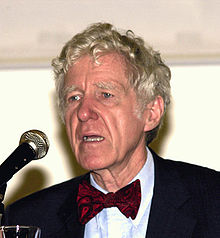Lester Brown
| Lester R. Brown | |
|---|---|
 |
|
| Born |
March 28, 1934 Bridgeton, New Jersey |
| Education |
Rutgers University (B.S., 1955) University of Maryland (M.S., 1959) Harvard University (M.P.A., 1962) |
| Occupation | Global environmental analyst, author, |
| Years active | 1959-2015 |
| Known for | Analysis of global warming, food shortages, water depletion and energy shortages |
| Website | Earth Policy Institute |
Lester Russel Brown (born March 28, 1934) is a United States environmental analyst, founder of the Worldwatch Institute, and founder and former president of the Earth Policy Institute, a nonprofit research organization based in Washington, D.C. BBC Radio commentator Peter Day referred to him as "one of the great pioneer environmentalists."
Brown is the author or co-author of over 50 books on global environmental issues and his works have been translated into more than forty languages. His most recent book is The Great Transition: Shifting from Fossil Fuels to Solar and Wind Energy (2015), in which he explains that the global economy is now undergoing a transition from fossil and nuclear energy to clean power from solar, wind, and other renewable sources. His previous book was Full Planet, Empty Plates: The New Geopolitics of Food Scarcity (2012).
Brown emphasizes the geopolitical effects of fast-rising grain prices, noting that "the biggest threat to global stability is the potential for food crises in poor countries," and one that could "bring down civilization." In Foreign Policy magazine, he describes how the "new geopolitics of food" has, in 2011, already begun to contribute to revolutions and upheaval in various countries.
The recipient of 26 honorary degrees and a MacArthur Fellowship, Brown has been described by the Washington Post as "one of the world's most influential thinkers." As early as 1978, in his book The Twenty-Ninth Day, he was already warning of "the various dangers arising out of our manhandling of nature...by overfishing the oceans, stripping the forests, turning land into desert." In 1986, the Library of Congress requested his personal papers noting that his writings “have already strongly affected thinking about problems of world population and resources,” while president Bill Clinton has suggested that "we should all heed his advice." In 2003 he was one of the signers of the Humanist Manifesto.
...
Wikipedia
